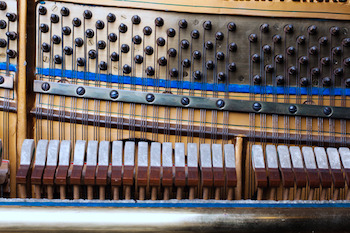Because your piano is a working instrument filled with moving parts, it needs a little more care than the average piece of furniture sitting in the same room. There are things only a trained technician should do to keep your piano in good working condition – tuning for instance. And there are some things you can do on a regular basis to help extend the life of your piano.
Regulate The Environment Around Your Piano
A piano performs at its best when the environment around it remains relatively stable. While that may seem difficult, especially with huge fluctuations in both temperature and moisture levels as we move from summer to winter, there are things you can do at home to regulate the temperature.
The cold can weaken the wooden parts of a piano; add too much pressure and they can snap. The heat can negatively effect the strings, and can loosen the felt on the hammers. Ideally the temperature in your room should always remain in the 70 to 72° F range, with humidity best in the 40 to 50 percent range.
Regulate the room’s temperature with an air conditioner or heater, but keep vents for both at a distance from the piano itself. Its also best to keep a piano away from an exterior wall so its not affected by extreme cold periods. Keep away from windows that allow direct sunlight to shine on the piano, which can cause discoloration and could possibly crack the piano’s finish.
Keep Drinks And Food Away From Your Piano
While this advice sounds very basic, it still is something that should be emphasized, especially to kids. In today’s world, we always have a glass of water or a water bottle at close range. And depending on the type of piano and its location, it may seem like the perfect resting spot for your drink. But if liquid seeps into the piano keys and reaches the interior of the piano, major damage can occur quickly.
If liquid spills onto the keyboard, wipe excess liquid from the keys’ surface immediately. To avoid water movement, try not to press any keys while cleaning up. If liquid does seep between the keys, contact a piano technician as soon as possible for maintenance.
For spills on electronic keyboards, unplug at once. Do not attempt to shake off excess water, and only clean up surface liquid. By pressing too hard, you can actually drive liquids deeper into the piano. Wait a few days to thoroughly dry out before plugging in and testing it. If any problems occur, consult with a piano technician for more information.
Adjust The Keylid
When you aren’t playing your piano, the keylid is designed to cover the keys and keep them safe from dust, air particles and other debris from your home. While covering your keys is a good idea, too much of a good thing can be bad as well. If the lid remains closed for too long, it can allow mold and mildew to form inside the keys, especially if the piano is kept in a dark or humid location.
Keep the keylid open periodically to allow air circulation over the keys. You can also occasionally go over your keys with a vacuum cleaner attachment to remove small particles that reside on the tops of the keys. A lightly dampened cloth can also be used to remove build up from your fingertips.

